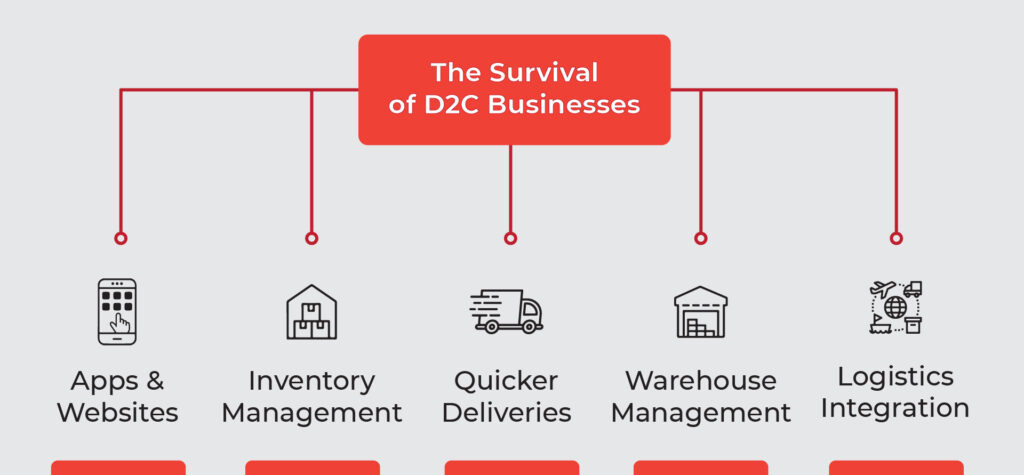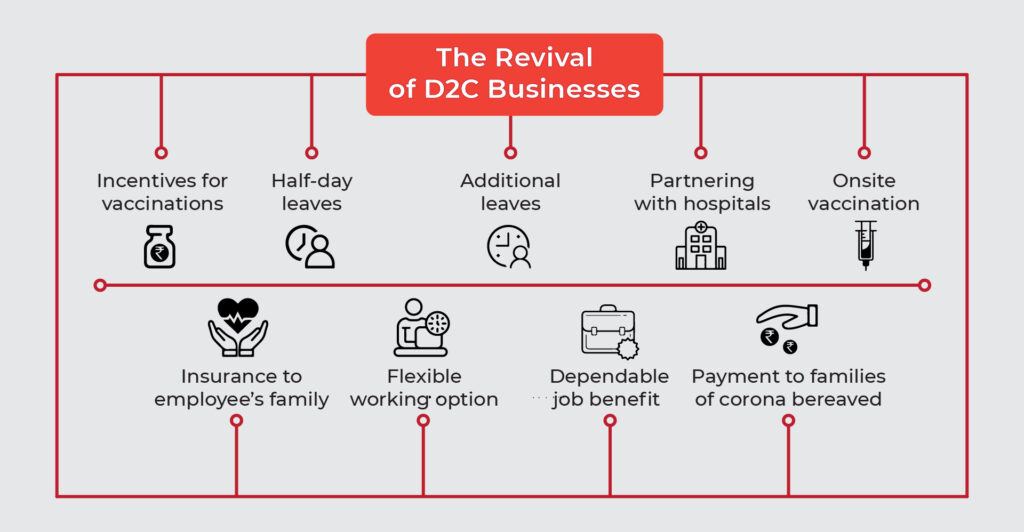Riddled with the challenges of lockdown and infection spread, the onset of covid-19 has laid a rough patch for several verticals but the wrath seems to have spared the direct-to-consumer (D2C) businesses. Why so?
The Road to D2C
The major e-commerce aggregators Amazon and Flipkart have been grappling to balance large order volumes and ensure the safety of their workforce. The Government’s mandate for delivery executives after making compulsions in taking RT-PCR tests frequently has crippled the delivery and procurement operations. It has increased the waiting time upto an entire week while many of the products ordered remain unavailable. The incomplete online orders received by the customers have led to dissatisfaction and a rough buying experience. Many small and medium-sized businesses are gradually sensing these challenges to weather the pandemic by following the D2C suit.
Several small and medium food outlets that initially began by selling food with aggregator companies Swiggy and Zomato are developing their website and apps to receive direct orders and building their delivery fleet. Businesses belonging to different verticals with no prior digital presence are emphasizing digital storefronts infused with AI and ML capabilities to sell products and services directly to consumers, therefore eliminating middlemen, increasing ROI and quick deliveries that otherwise required to pay a commission of 20-40 percent for listing products in Amazon or Flipkart.
More Revenues for Primarily Digitally Driven D2C Brands in the pandemic
The first covid wave could not dwindle the profits for D2C companies like Boat – a primarily digital-driven brand in the wearables vertical. It clocked a gross revenue of Rs 500 Crore in 2020 and occupied 2.6 percent of the global wearables sharing the fifth position with Google’s Fitbit, according to the latest report of International Data Corporation.
Interestingly, despite the closure of colleges and women working from home, the Indian digital cosmetic brand Sugar witnessed a growth of 60 percent more than the pre-covid sales and generated revenue of Rs 200 crores over 300,000 orders.
With a deluge of affordable smartphones and low data costs giving impetus to online shopping, D2C brands are estimated to be a market worth $100 billion by 2025, as per a report from Avendus Capital.
‘‘
D2C businesses are estimated to be a market worth $100 billion by 2025 in India, as per a report from Avendus Capital.
Survival of D2C businesses in the pandemic wave

The direct-to-consumer model will help businesses to offer a smooth consumer experience as it creates direct linkage with the customer and smoothens distribution irregularities. D2C businesses can save on the commission spent on aggregators and intermediaries and help gain autonomy over profit margins.
Omnichannel Strategy
The presence of products in both offline and online channels will help D2C businesses in better distribution of inventory and offer customers a fully integrated experience across both channels which improves brand visibility, customer retention, and loyalty. It also induces convenience buying.
D2C businesses can adopt Buy Online Pick Up in Store (BOPIS) commonly called Click and Collect, where the customer places the order online and picks the item from the physical store. BOPIS combined with inventory management brings fluidity in distribution.
Creating Digital Storefronts
Businesses which listed their products aggregator platforms were devoid of receiving consumer insights. With the development of store apps backed by AI and ML, it can provide necessary insights to D2C businesses about customer patterns, trends, preferences, therefore, aiding them in better customer classification and focussed marketing. For first-time users, the digital storefronts can have the option of ‘Guest User’ many users would not like to go through the account creation hassle. Owning a digital storefront helps D2C businesses to brand themselves by creating brand messages, personalized offers, etc.
Logistics integration for fast delivery
D2C businesses should make ‘ Faster delivery’ the major point of difference from the e-commerce aggregators. A D2C company can achieve faster deliveries with multiple shipping companies. The selection of shipping companies for particular geography can be digitized where the customer as soon as he/she puts the pin code on a website or app the algorithm selects the courier company.
Inventory and Order Management
As D2C businesses are encouraged to adopt an omnichannel strategy, there lies a high probability of stock out or order duplication. Therefore, to avoid such hiccups a D2C brand must invest in inventory management solutions that will act as a consolidated database of inventory levels across multiple stores. It will enable visibility to the business owners on stock movements ensuring timely and error-free tracking of stocks, sales, and revenues. Order management solutions will aid businesses in generating orders automatically to the right fulfillment centres based on the location, quantity, or version of a product, payment method, stock availability, etc.
Revival Strategies for D2C businesses

Businesses across verticals are wary of operating with a workforce in full capacity in the pandemic, however, the rollout of vaccines appears to be the light at the end of the tunnel. But what about it? Having a healthy and inoculated workforce is integral to a company’s growth. Therefore, D2C businesses to ensure continuity should proactively devise strategies to inoculate their workforce. Here are some of them that businesses can implement :
Incentives for employees
Amazon US is offering $100 as an incentive to the new hires with proof of Covid-19 vaccination. Similarly, D2C businesses in India can offer incentives to their employees or recruits for getting vaccinated after showing the proof.
Half-Day leave for vaccination
Vaccination centres or hospitals follow a stringent procedure of social distancing which means there will be a long queue which can take either a whole day or half-day of an employee, thus businesses in their leave policy should include offering half-day or full-day leave for vaccination to their employees
Additional Rest Leave
An individual after receiving jabs, might feel feverish or weak as the antibodies are aligning themselves to the body’s immunity system. For such, companies should allow employees to take additional sick leave for ample rest and recuperation.
A vaccine Finder
Paytm has created a vaccine finder initially for its employees to help them find a vaccination slot at the earliest for a specific date on the PIN code entered. Later, the vaccine finder on its platform was kept open for the customers as well.
Onsite Vaccination
Businesses can organise vaccination drives in association with licensed health care providers in their workplace free of cost to ensure none of the employees is left.
Offering monetary support to corona bereaved families
Families whose earning members have died due to Covid can be offered monetary support. Bajaj Auto is offering monetary support to the family of the deceased employee up to two years after their demise.
Extending insurance to the families
Companies can offer health insurance not only limited to the employee’s spouse and children but his/her in-laws as well.
Reimbursement of vaccine and medicine costs
Companies can reimburse employees vaccine and medical costs incurred during the 14 day quarantine period.
Flexibility in work from home
Companies should have a policy where employees have the freedom to take work from home option who have elderly parents at home or have recently become a father/mother.
In the ongoing vaccination phase, the D2C businesses need to plan their business tasks for vaccination days and sanction leave to the employees accordingly so that there is no friction in working. Similarly, when employees have opted to work from home, the D2C businesses must adopt superior cloud communication tools and cybersecurity to ensure seamless remote working.




